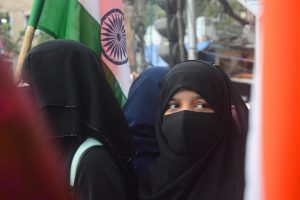
Staff Writer
Since January, educational institutions in India, have sought to force Muslim women to discard the hijab, under the guise of prohibiting any form of religious attire. This has fed into a broader milieu of discrimination against Muslims, with Karnataka, the state that has most vociferously sought to uphold a form of hijab ban, banning the sale of cow meat. Further, Muslim women have seen themselves advertised for sale on websites, while lynching, and arrests on dubious grounds, have become common. Muslims and opposition parties, together with civil society have protested this, without much success.
Speaking to Radio Islam International, activists Safoora Zangar and Kavita Srivastava, argued that these activities are increasing, and that the conditions for genocide are impending if not already existent. Safoora said, “Everyday, there is horrible news of a lynching of a Muslim, or the mosque being attacked. That is a renewed and systematic attack on our identity as Muslim, it’s an existential crisis that we face here… I’m not being an alarmist If I’m saying that Indian Muslim are on the cusp of genocide.”
Both activists agreed that the Hijab ban fell into this pattern and was an attempt to strip Muslim women of their independence, their religion, and their right to an education. The ban, according to Srivastava, was aimed at “getting people to attack Muslim women any time, all over. It may be in shops, may be in public places. It’s going to just go on and on; Hijab has now become the symbol that the Muslims are trying to take over India.”
Srivastava argued that civil society was uniting, but that change would only occur if the political ‘disequilibrium’ changes, that is if Modi loses in the upcoming state elections. Further, she argued that the wards of unemployed are easily being influenced and manipulated to adhere to the ideology of Hindutva, and that for this to change, will require a long process.







0 Comments